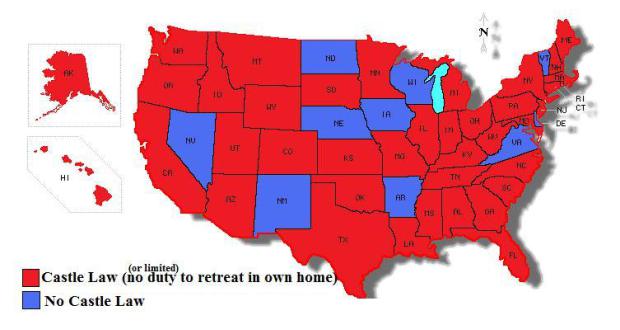State Law that Legalized Self Defense Against Cops Just Got Man's Conviction OverturnedBy Jay SyrmopoulosThe Free Thought Project Mar. 16, 2015 |
Popular 
Mike Johnson Pushes Debunked Lie That Israeli Babies Were 'Cooked in Ovens' On October 7

'It Has to Be Stopped': Netanyahu Demands Pro-Palestine Protests at U.S. Colleges Be Shut Down

'These Protesters Belong in Jail': Gov. Abbott Cheers Arrest of Pro-Palestine Protesters at UT Austin

Claim Jewish Student Was 'Stabbed In The Eye' by Pro-Palestine Protester Draws Mockery After Video Released

'Sniper Seen on Roof Overlooking Pro-Palestine Protest' at Indiana University
 Indianapolis, Ind. -- In a case of first impression, David Cupello v. State of Indiana, the Indiana Court of Appeals reversed David Cupello's conviction on charges of battery on a law enforcement officer. The court found that he exercised reasonable force under an amendment to Indiana law which legalized using force against "public servants" that unlawfully enter another person's property. The law states: (i) A person is justified in using reasonable force against a public servant if the person reasonably believes the force is necessary to: (1) protect the person or a third person from what the person reasonably believes to be the imminent use of unlawful force; (2) prevent or terminate the public servantís unlawful entry of or attack on the personís dwelling, curtilage, or occupied motor vehicle; or (3) prevent or terminate the public servantís unlawful trespass on or criminal interference with property lawfully in the personís possession, lawfully in possession of a member of the personís immediate family, or belonging to a person whose property the person has authority to protect. The special amendment came in response to an Indian Supreme Court decision, Barnes v. State, which held that "the Castle Doctrine is not a defense to the crime of battery or other violent acts on a police officer." Indiana recognized the sacred nature of an individualís residence and took immediate action to "recognize the unique character of a citizen's home and to ensure that a citizen feels secure in his or her own home against unlawful intrusion by another individual or a public servant." Cupello was originally convicted of battery on a law enforcement officer during a bench trial on May 12, 2014. This ruling was based upon his slamming of his door on the foot of Robert Webb, an off-duty constable employed as a part-time security for the apartment complex. Cupello was sentenced to 365 days in jail with 361 suspended for the battery conviction. Webb initially went to Cupello's apartment to investigate "reports of intimidation" after staff complained of a verbal conflict. Upon Cupello opening the door to his apartment, Webb stuck his foot in the apartment to prevent the door from being closed on him, according to court documents. Court records state that after becoming agitated, Cupello attempted to close the door numerous times, hitting Webb's foot that had been placed "inside the threshold of the door." Cupello was able to close his door but Webb claimed that the door had hit him in the foot, shoulder, and head and told Cupello he was under arrest for battery. After Cupello refused to open the door for Webb, the officer called for backup and got a key from the apartment complex management office for Cupello's apartment. The officers then entered his apartment without a warrant and arrested Cupello solely for the crime of battery for hitting Webb with the door. But the appeals court reasoned that, "Constable Webb had entered Cupello's apartment without consent, probable cause, reasonable suspicion, or exigent circumstances. Because Constable Webb resisted Cupello's subsequent attempts to close the door, Cupello had a reasonable belief that force was necessary to terminate Constable Webb's unlawful entry into his apartment."Self-defense is a natural right; when laws are in place that protect incompetent police by removing the ability to protect one's self, simply because the aggressor has a badge and a uniform, this is a human rights violation. "The placement of Constable Webb's foot inside the threshold of the apartment door was an unlawful entry by a public servant into Cupello's dwelling, and Cupello exercised his statutory right under Indiana Code Section 35-41-3-2(i)(2)--which reaffirmed that the Castle Doctrine is an affirmative defense to the crime of battery on a law enforcement officer-- to use reasonable force both to terminate that entry and to prevent further access to his home. Cupello used reasonable force by closing his door. Thus, as a matter of law, the facts do not support a conviction for battery on a law enforcement officer."Castle Doctrine is part of American common law derived from the English system. Under English law, a man's home was his castle. In present-day America, individual rights are supposed to be inalienable. Will your home be your castle or is it simply a place the government allows you to reside until it gives further notice? Indiana is leading the way by recognizing this right, creating legislation to protect it, and having a judiciary that interprets the law as it was written.  Jay Syrmopoulos is an investigative journalist, freethinker, researcher, and ardent opponent of authoritarianism. He is currently a graduate student at University of Denver pursuing a masters in Global Affairs. Jayís work has previously been published on BenSwann.com and WeAreChange.org. You can follow him on Twitter @sirmetropolis, on Facebook at Sir Metropolis and now on tsu. |



